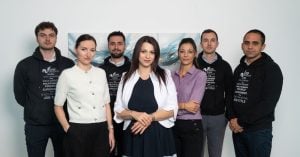Now, in light of the Russian-Ukrainian war and the increasing number of citizens and businesses looking to relocate to CEE, the narrative about cybersecurity becomes stronger than ever. This puts the well-established players such as IBM, and Cisco Systems in a good position to fill in the gap in the CEE cybersecurity market, while at the same time developing new services and solutions with regional talent.
With increased instances of data breaches, expanding digital user base, and digitalization of more public sectors in CEE, the regional cybersecurity market is projected to reach $11B in the next 5 years. On average, the 18 CEE countries report more than 110 cyber incidents every year, and the jurisdictions with the highest number of instances are Romania, the Czech Republic, and Hungary.
Earlier this month, Atos, the France-based IT company, opened a Security Operations Center in Sofia, Bulgaria, as part of its international expansion strategy. The center is one of the sixteen SOC of Atos worldwide and is expected to hire around 50 cybersecurity professionals by the end of 2022. The goal of the SOC would be to identify and limit the impact of cybersecurity incidents for large international organizations with the use of the latest AI and ML technologies.
To find out more about the regional cybersecurity scene and better understand how the new Atos SOC would fit into it, The Recursive talked with Elena Diamandieva, Head of Cybersecurity Operations at Atos Sofia.
Choosing Sofia to build niche skills
The Security Operations Centers of Atos handle more than 31 billion security events per day. The new center would complement this line of defense and will complete Atos’ end-to-end security offering. It will provide key security services to the customers of Atos in the region, including risk identification and governance, threat intelligence, protection, incident detection, analysis, response, and remediation. Some of the international clients of Atos, for reference, include names such as Microsoft, Nokia, European Space Agency, and Philips.
“For us, at Atos, it came as a logical decision considering we already have a strong team of digital transformation experts here and we trust the local skills. This would be the 16th Security Operations Center of Atos and it is an expansion driven by the demand of clients based in Europe. In the upcoming years, we would like to expand our local capabilities by hiring up to 300 digital specialists,” Elena Diamandieva shares.
In Bulgaria, the Atos group is represented by two companies with over 1500 employees – Atos IT Solutions & Services, and Atos Bulgaria Competency Center. Last year, the company delivered and assembled the Bulgarian supercomputer at Sofia Tech Park. The new SOC is the fourth one established in CEE, after the centers in Croatia, Romania, and Poland.
“Based on our market research we have no doubts that we will find the right talent and people would be interested in joining the top player in cybersecurity services in Europe. We are also ready to support the further development of those niche skills in Bulgaria. At Atos, we have an in-house Cybersecurity Academy to develop cybersecurity experts using a blended learning approach of self-paced online training, boot camps, technology-agnostic, and cyber security-specific partners’ certifications,” Elena Diamandieva points out.
Top 3 cybersecurity threats in 2022
Diamandieva explains that cyber attacks are a persistent threat to all organizations and the risks are increasing rapidly. She refers to the latest Forbes reports, which highlight that almost $3B is lost every minute to cybercrime. In addition, in January 2022, the World Economic Forum listed cybercrime as one of the biggest threats facing society in the next decade. “Part of the reasons behind it are connected with the digital transformation which was strongly accelerating in the last few years, especially since the pandemic. Each industry had to adapt and modernize its structure, business processes, and technologies,” she explains.
As a consequence, the cyber threat landscape started moving very fast. Threat actors launch new innovative techniques and take advantage of new vulnerabilities every year.
“Every year, we must evolve and adapt our defenses to protect against the next wave of large-scale threats we will face. The top 3 threats in 2022 will remain ransomware, supply chain threats, and vertical specialized threats. Just as an example, for a third consecutive year, the healthcare and health sciences sector suffered the greatest number of data breaches, which accounted for 297 million breached records. The public sector was the other main contributor with a total of 794 million breached records according to IT Governance. Private and public organizations need to prepare for those challenges and make the right decisions for their digital security,” Diamandieva concludes.







